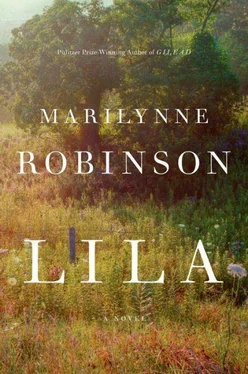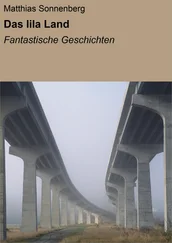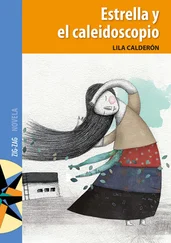Those first few days, clearing out the shack and washing at the river, finding dandelion greens and ferns still coming up and wild carrot, finding a rabbit burrow. Life is hard in the spring, and still it all felt like something she had almost died for the want of. She found a patch of violets blooming and lay down there, and ate every single flower, one by one, the way Mellie used to do. Mellie sitting there Indian-style with a blossom perched on the tip of her tongue like a toad with a butterfly, thinking about something else, some plan for the next ten minutes. Once, when she had that look on her face, Marcelle said, “Now what’s she getting up to?” and Doane said, “She’s just hatching a couple more freckles.” Lila told the child, “I believe I really was a little crazy then, because things I remembered seemed so real to me. I don’t wonder at it. I just hope nobody saw me acting that way.” There was a time, when she was riding along in that car with the window down a crack, smelling the dark, wet fields, that she thought when she got the chance she might just lie right down on the ground in some lonely place and let the world take her life away. She felt that way when she saw those violets and remembered the old times, and she did lie down, but then the ants started bothering. There always was something bothering, and you had to be scratching and shifting around. The world don’t want you as long as there is any life in you at all.
But a place like that, just waiting, unless somebody came along and said it was his. She’d left the bottles and tins where they were except in the one corner, so it wouldn’t look like she meant to take the place if she didn’t have the right. But she did spread out her bedroll and lie down, and next thing she knew, it was almost morning. She could hear the birds singing. What is it they know, when the sky is still dark? Mellie said if just one of them saw just one bit of light, it’d wake up the rest of them and then they’d all go at it, making sure none of them stayed asleep. That’s what she did herself when she woke up first, no matter how early it was. Hum, hum, hum. I just wisht I knew where they put them matches. They got to be somewheres around here. Hum, hum, hum. I was thinking I’d get breakfast started. Tripping over Lila’s foot once or twice. What would one bit of light look like? A star. The birds would never be sleeping at all. Mellie would say, That’s all right, I know what I know.
She thought for a few days that she must have come to the end of her life, because it felt so much like the beginning of it. She was waiting for something to happen and nothing did. Then she started thinking about the movies again, until she was afraid she would get tired of them, that she’d wear them out and wouldn’t have them anymore to go back to. And then she decided she’d take a look at that town they’d passed through. Well, she had the money she didn’t have to spend on a bus ticket, so she could walk into town and buy a few things.
She’d noticed there was a movie theater, which you wouldn’t really expect in a town that size. She strolled by to see what was playing. To Have and Have Not. She’d seen it. That’s the worst part about a small town. Well, pretty soon she wouldn’t even know how long something had been showing in the city. Not that she should be spending money on a movie now anyway. Fishing line, fishing hooks, a pot, cornmeal, some matches. The man at the counter looked at her like Well, I never seen you around here before, meaning to be a little friendly, and she looked at him like Mind your own damn business. That same man gave her a big jar of cloves for a wedding present, wrapped in white paper. “Helps with the toothache,” he said. He played third base and the Reverend pitched, back in the old, old days. At first she just hated having to deal with anybody. Then she got used to seeing how the gardens came along. Sometimes people would nod when she passed. She made up her mind about which house was the prettiest. That wasn’t the one where she stopped to ask the lady if she might be looking for some help. Mrs. Graham. She was working in her garden and Lila saw her there and thought she might as well ask. There are women who take pride in how kind they are and jump at every chance, their eyes all shining with it so you can’t help but notice. You keep clear of them if you can, but they do come in handy. Sometimes you want a bowl of soup. She said, “Why, yes, dear, I am! Yes, I am looking for help!” Just like that. She didn’t give herself a minute to decide. Lila thought, I should mention the knife in my garter and see what she says then. But that was just a joke she made to herself. She said, “I’ve done housework and farm work. I’m good with growing things.”
“Well, that’s fine!” The woman rubbed her hands on her apron. “I’m behind on the weeding! I was hoping for a little rain yesterday or today, but nothing, so I thought I might as well get to it! If you could help with the onions,” as hasty about it as if she might miss an opportunity. So Lila at least might have a door she could come to, someone who knew her name. The woman made such a point of not looking her over that Lila could see what she must have thought of her. “Lila! What a pretty name!”
It was a good-looking garden, though. A garden never really belongs to somebody else if you’re the one that takes care of it. The soil was nice as could be, and the plants had all those good smells. Just brushing by the tomato plants, getting that musk on them, made her clothes seem clean. She was still waiting to hear somebody say the name of the place. It was painted on the water tower, so coming to town she walked along looking up at that word, wondering what it was supposed to sound like. Of course it was a Bible word. The old man would tell her that.
She said to the child, “Now I been in Gilead a pretty long time. A lot longer than I expected. And you’re going to be born here. If I leave I’ll take you with me, I will for sure. I’ll tell you the name of the place, though. People should know that much about themselves anyway. The name of your father. Could be I won’t ever leave. The old man might not give me cause.” And then she almost laughed, because she knew he never would. She said, “That old man loves me. I got to figure out what to do about it.”
She never stayed away from church anymore, for one thing. It still reminded her of that first time, when she was sitting there, rain dripping off her hair, down her neck, cold rain soaked into her shoes, hoping he wouldn’t notice her. He was going on about baptism. A birth and a death and a marriage, he said. A touch of water and these children are given the whole of life. The sacraments remind us. She was thinking what sense did that make, but his eyes drifted across the congregation and rested on her face, as if he thought she might know what he meant and could say yes, it was true, what he meant if not the words he could find to put it in. Jesus drank from our cup and shared our baptism, he said, which meant He suffered and died like everybody else. And she was thinking how strange it was for them to be there singing songs to somebody who had lived and died like anybody. Doll would say, That’s the way it is. They could as well be singing about Doll. And then she was thinking of that song they used to like in St. Louis, what a night to go dreaming, and his eyes drifted back to her again, and he looked at her until he remembered not to. When she thought about it afterward, she knew she couldn’t have counted to five before he looked down at his papers and then at the people in front of him. Still.
Now that she was his wife he looked at her whenever he mentioned something they might have talked about, to let her know he thought about the questions she asked him, or questions she knew he asked himself. Sometimes he gave the sermon to her to read before he preached it. One morning he read to her at breakfast, something he had written during the night. “Very rough,” he said. “Half of it I’ve crossed out. And this was supposed to be the clean copy.” He cleared his throat. “So. ‘Things happen for reasons that are hidden from us, utterly hidden for as long as we think they must proceed from what has come before, our guilt or our deserving, rather than coming to us from a future that God in his freedom offers to us.’ My meaning here is that you really can’t account for what happens by what has happened in the past, as you understand it anyway, which may be very different from the past itself. If there is such a thing. ‘The only true knowledge of God is born of obedience,’ that’s Calvin, ‘and obedience has to be constantly attentive to the demands that are made of it, to a circumstance that is always new and particular to its moment.’ Yes. ‘Then the reasons that things happen are still hidden, but they are hidden in the mystery of God.’ I can’t read my own writing. No matter. ‘Of course misfortunes have opened the way to blessings you would never have thought to hope for, that you would not have been ready to understand as blessings if they had come to you in your youth, when you were uninjured, innocent. The future always finds us changed.’ So then it is part of the providence of God, as I see it, that blessing or happiness can have very different meanings from one time to another. ‘This is not to say that joy is a compensation for loss, but that each of them, joy and loss, exists in its own right and must be recognized for what it is. Sorrow is very real, and loss feels very final to us. Life on earth is difficult and grave, and marvelous. Our experience is fragmentary. Its parts don’t add up. They don’t even belong in the same calculation. Sometimes it is hard to believe they are all parts of one thing. Nothing makes sense until we understand that experience does not accumulate like money, or memory, or like years and frailties. Instead, it is presented to us by a God who is not under any obligation to the past except in His eternal, freely given constancy.’ Because I don’t mean to suggest that experience is random or accidental, you see. ‘When I say that much the greater part of our existence is unknowable by us because it rests with God, who is unknowable, I acknowledge His grace in allowing us to feel that we know any slightest part of it. Therefore we have no way to reconcile its elements, because they are what we are given out of no necessity at all except God’s grace in sustaining us as creatures we can recognize as ourselves.’ That’s always seemed remarkable to me, that we can do that. That we can’t help but do it. ‘So joy can be joy and sorrow can be sorrow, with neither of them casting either light or shadow on the other.’”
Читать дальше












